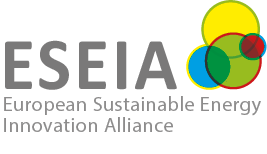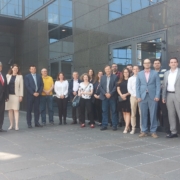RE4Industry Knowledge Transfer Seminar Croatia: Key Takeaways
On 13 June 2023, more than 60 participants gathered in Zagreb, Croatia, and online for the fourth RE4Industry Knowledge Transfer Seminar, hosted by the University of Zagreb – Faculty of Mechanical Engineering and Naval Architecture, to discuss the decarbonisation of energy-intensive industries (EIIs).
EIIs such as iron and steel, minerals, refineries, and chemicals are significant economic sectors in Europe and, at the same time, major emitters of greenhouse gas, making it crucial for them to shift away from fossil fuels and tackle climate change effectively.
The fourth RE4Industry Knowledge Transfer Seminar took place on 13 June 2023 in Zagreb, Croatia, offering a platform for experts from academia and industry to keep discussing challenges and opportunities presented by the energy transition in EIIs. The seminar, co-organised by ESEIA and the University of Zagreb – Faculty of Mechanical Engineering and Naval Architecture, marked the completion of the series initiated last year as part of the Horizon 2020-funded project RE4Industry.
The session started with the opening remarks by the ESEIA Director Brigitte Hasewend and the ESEIA President and Rector of the Graz University of Technology Harald Kainz, who acknowledged the challenge and stressed the importance of a coordinated effort between stakeholders to decarbonise EIIs and achieve the European Green Deal. Then, the Managing Director at Renewable Energy Sources of Croatia Maja Pokrovac and the State Secretary of the Ministry of the Economy and Sustainable Development, Croatia, Ivo Milatić expressed the need to address barriers and provide solutions to help EIIs across Europe, including Croatia, navigate the complex transition to renewables.
One of the key takeaways of the seminar was that energy transition is not only feasible but also beneficial for EIIs. By embracing innovation and investing in net-zero technologies and sustainable solutions, EIIs can maintain a competitive edge in a world that is inevitably moving to a net-zero future.
Towards 100% renewable energies in EIIs
The decarbonisation of the EIIs in Europe will rely on the progressive use of an energy mix that ensures the competitiveness of its different sectors on a global scale. With the gradual decrease of renewable power prices and the conversion of natural gas-dependent processes, electrification (using electricity from renewable energy sources such as photovoltaics, wind, hydraulic) will play a vital role in decarbonising EIIs.
Additionally, to meet the diverse temperature needs in EIIs, renewable heat can be produced from sources such as solar thermal, heat pumps, geothermal, biomass, biofuels and green hydrogen. As the Research Associate at CERTH Dimitrios Papaggelis explained, emissions produced from fuel’s combustion could be avoided by switching the fuel mix with fuels that are not contributing to the carbon footprint such as the use of biomass.
Green hydrogen is one of the most promising solutions for decarbonising EIIs, especially in the steel sector. In fact, green hydrogen, as the long-term option, was considered in case studies of the three EIIs that are a part of the RE4Industry project Consortium, highlighted Senior Consultant at BTG – Biomass Technology Group Martijn Vis. However, its widespread adoption requires further development and investment. The current cost of renewable and low-carbon hydrogen is too high, while the availability of hydrogen-related infrastructure is low, noted the CEO of Indeloop Danica Maljković.
As the RE4Industry Project Coordinator Alessandro Carmona pointed out, continuous efficiency improvements in industrial processes, a shift towards electricity where feasible, material efficiency, and the adoption of circular economy principles will be necessary to reduce emissions and reach climate targets by 2050.
Social acceptance dimensions in energy transition
Social acceptance is as important for a successful energy transition in EIIs as research and development in areas such as zero-carbon hydrogen production and renewable gases use. The survey conducted by White Research, the RE4Industry Consortium partner, to assess public perceptions of biomethane and hydrogen in Spain, the Netherlands, and Greece revealed that while a general acceptance of renewable energy sources is high, low local acceptance has hindered the development of renewable energy projects.
According to the Associate Project Manager at White Research Nina Louvrou, perceived risks have the most significant negative impact on public perceptions of biomethane and hydrogen technologies in these countries. Additionally, the local samples within the three countries displayed more hesitancy and less positive attitude towards the technologies compared to the general national sample. These results underscore the importance of communicating the benefits and tailoring strategies to address concerns and ensure successful implementation of renewable energy projects.
The sustainability imperative
With the current decade being decisive in taking action, more and more companies in Croatia and other European countries are embracing sustainable practices to secure a viable future.
Holcim, a global leader in building solutions, is committed to supporting the construction industry with low-carbon products and smart design systems. Additionally, in the long-term, the company aims to integrate new and advanced technologies, which include novel binders and CCUS, explained the Decarbonisation Champion – Circularity at Holcim Switzerland Virna Višković Agušaj.
Another leading example in tackling climate change is Molson Coors beverage company. As the R&D, Transformation & Innovation Director Molson Coors Central and Eastern Europe Daniel Verbanac explained, the company is committed to reducing emissions across its operations and value chain by increasing energy efficiency, renewable energy sources and design for recyclability and reuse.
The fourth RE4Industry Knowledge Transfer Seminar showcased not only the solution pathways and success cases but also the potential for cooperation among academia, industry, policymakers and other key stakeholders. By working together, embracing renewables, and implementing sustainable solutions, we can create a greener future for EIIs and our planet.
Thank you to the University of Zagreb – Faculty of Mechanical Engineering and Naval Architecture, the team led by Professor Goran Krajacic, and all the speakers, moderators, partners, and participants for a successful final RE4Industry Knowledge Transfer Seminar!
Get to know the speakers here!
More information about RE4Industry Knowledge Transfer Seminar Series events is available here.
Contact:
ESEIA Team: office@eseia.eu


